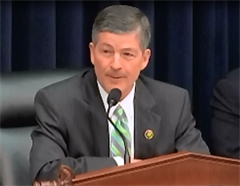|
CLICK HERE TO WATCH |
Financial Services Committee Chairman Jeb Hensarling (R-TX) delivered the following opening statement at today’s hearing to examine whether the Dodd-Frank Act has made the U.S. financial system more stable. Today’s hearing is the first of three the committee will be holding to examine the impact of Dodd-Frank five years after it was signed into law:
Five years ago this month Dodd-Frank was signed into law. Undoubtedly it is the most sweeping and dramatic rewrite of banking and capital markets laws since the New Deal. Weighing in at 2,300 pages, 400 new rules, it is clearly dramatic. Whether fan or detractor, this committee would be negligent if we were not vigilant in our oversight in both the impact and the implementation of Dodd-Frank; negligent we will not be.
So today marks the first of three hearings to be held on the Dodd-Frank bill posing three different questions: Five years after Dodd-Frank are we more prosperous? Five years after Dodd-Frank are we more free? And the focus of today’s hearing, five years after Dodd-Frank are we more stable?
I frankly believe it remains an open question whether we have achieved greater stability. I fear the answer is no, but were the answer to be yes -- when you look at the damage Dodd-Frank has done to our economic growth, to family finances and consumer freedom -- I am rather doubtful it would be worth the cost.
Clearly balance sheets have improved post- Dodd-Frank and banks have de-levered. This is a necessary and good thing. I strongly suspect that market forces would have brought about these actions regardless of Dodd-Frank. Regulators already possessed the powers to have set more prudent capital and leverage standards. Still Dodd-Frank very well may have been helpful in this regard.
What is undebatable is the fact that since the passage of Dodd-Frank the big banks are now bigger; the small banks are now fewer. In other words, even more banking assets are now concentrated in the so-called “Too Big to Fail” firms. Pray tell, how does this improve financial stability?
Dodd-Frank has codified “Too Big to Fail” into law and provided a taxpayer-funded bailout system in Title I and Title II of the Act. This simply leads to even greater moral hazard and to greater instability. According to the Richmond Federal Reserve, the explicit federal guarantees of financial sector liabilities have increased to a whopping 60 percent post- Dodd-Frank. When private investors, depositors, and counterparties expect a bailout, their incentives to monitor risk clearly wane. Regulatory micromanagement is no substitute for market discipline. By this measure, Dodd-Frank has clearly made our financial system riskier.
Part of the expansion of the federal backstop has been the creation of a whole new class of “Too Big to Fail” institutions, namely centralized clearinghouses for derivatives. Here Dodd-Frank did not lessen risk, it just centralized it and placed it on the taxpayer balance sheet.
Next, Dodd-Frank’s Volker Rule along with the Basel Accords caused a massive drop in corporate bond inventories. Many economists now believe the next financial crisis could very well result from the illiquidity and volatility in our bond market.
Senator Dodd of Dodd-Frank said, “No one will know until this is actually in place how it works.” Five years later, we have a clue and we are learning that our financial system may very well be less stable under Dodd-Frank.
